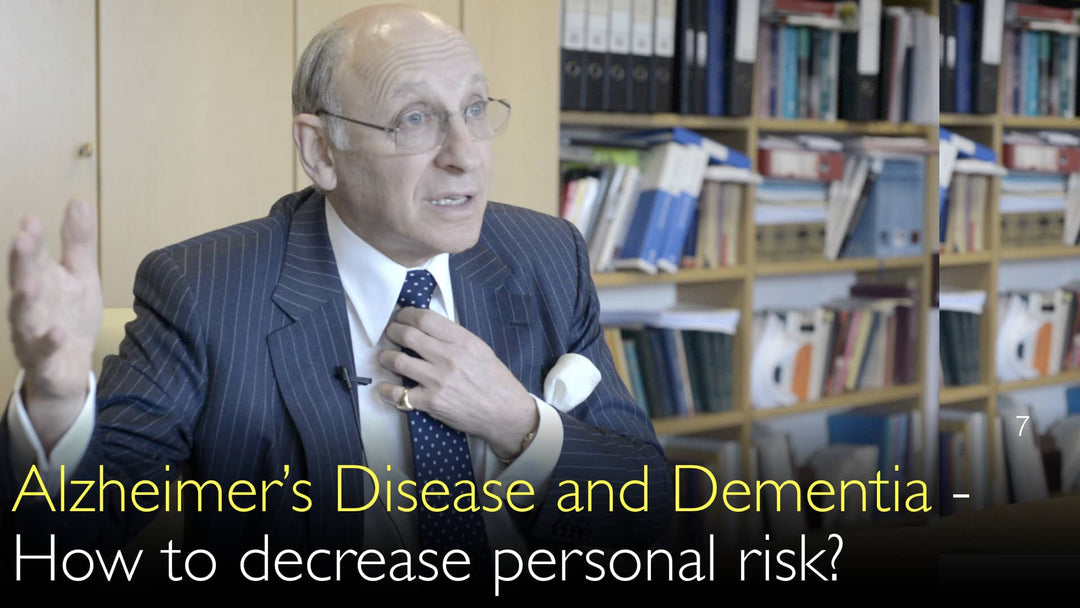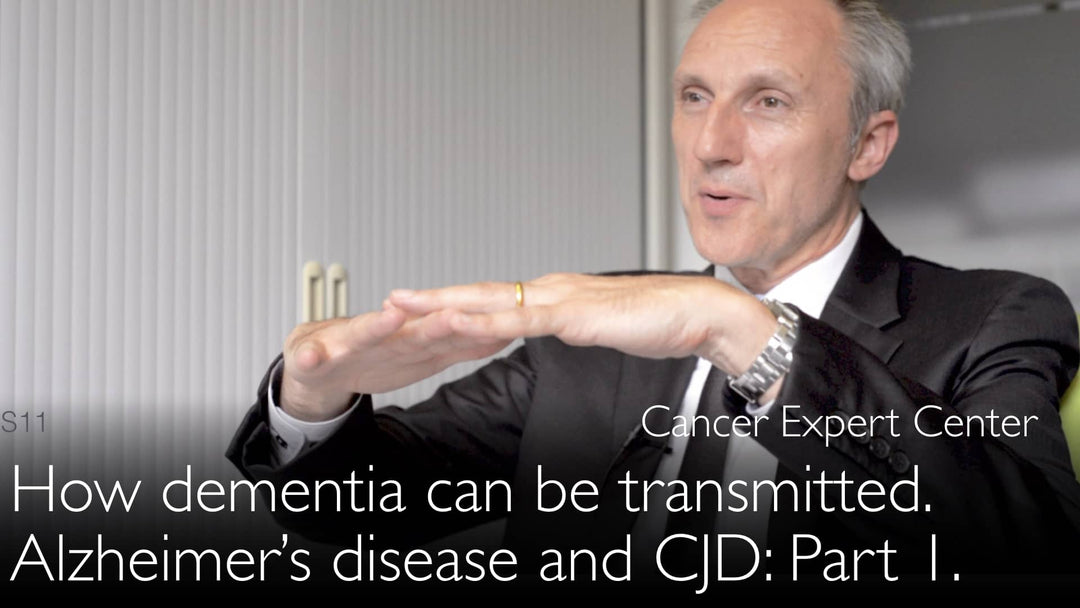Leading expert in amyloidosis and inflammation, Dr. Mark Pepys, MD, explains how to decrease personal risk for dementia. He clarifies the critical link between vascular health and cognitive decline. Dr. Pepys details actionable prevention strategies like blood pressure control and statin use. He also discusses the evidence behind brain exercises and lifestyle modifications for preserving cognitive function.
Effective Strategies to Reduce Dementia and Alzheimer's Disease Risk
Jump To Section
- Vascular Dementia and Alzheimer's Disease Link
- Lifestyle Prevention Strategies for Dementia
- Brain Exercise and Cognitive Reserve Evidence
- Blood Pressure and Cholesterol Control Importance
- Statin Therapy Benefits for Vascular Health
- Future Alzheimer's Disease Research Directions
- Full Transcript
Vascular Dementia and Alzheimer's Disease Link
Dr. Mark Pepys, MD, emphasizes that dementia is a broader clinical syndrome than Alzheimer's disease. He explains that vascular problems are a very important cause of dementia. This vascular dementia is directly related to atherosclerosis and vascular disease.
The same atherosclerotic process that causes heart attacks and brain strokes also contributes significantly to cognitive decline. Dr. Mark Pepys, MD, notes that all older people diagnosed with Alzheimer's disease inevitably have some atherosclerosis. This vascular component makes a more or less significant contribution to their overall dementia presentation.
Lifestyle Prevention Strategies for Dementia
Dr. Mark Pepys, MD, provides clear advice for mitigating dementia risks through lifestyle modifications. He states that all measures to reduce cardiovascular disease risk are critically important for preventing cognitive decline. The fundamental strategies include not smoking and avoiding type 2 diabetes.
Maintaining a healthy weight through physical exercise and eating a balanced diet are equally crucial. Dr. Pepys confirms that mitigation of cardiovascular risk will definitely make a significant contribution to reduction of both dementia and Alzheimer's disease. These interventions directly address atherosclerosis in brain arteries that develops with aging.
Brain Exercise and Cognitive Reserve Evidence
Dr. Mark Pepys, MD, offers a nuanced perspective on brain exercise and cognitive activity. He acknowledges the observational evidence that smarter, more educated people appear to get less dementia. However, Dr. Pepys suggests this may reflect their higher baseline intelligence rather than protection from decline.
He explains that losing a proportion of intellect from a higher starting point may leave better function than losing the same proportion from a lower baseline. While Dr. Pepys values being interested, alert, and perceptive, he remains unconvinced that brain exercises alone protect cognitive function. Much of the evidence remains observational rather than conclusive.
Blood Pressure and Cholesterol Control Importance
Dr. Mark Pepys, MD, highlights the critical importance of controlling blood pressure to prevent dementia. He emphasizes that maintaining low blood pressure contributes very substantially to reducing vascular disease risk. This vascular protection directly supports cognitive health preservation.
Dr. Pepys also stresses the crucial need to control cholesterol levels, particularly LDL cholesterol. During his discussion with Dr. Anton Titov, MD, he notes the unequivocal relationship between LDL cholesterol concentration and cardiovascular risk. This relationship follows a linear pattern regardless of where an individual falls on the cholesterol spectrum.
Statin Therapy Benefits for Vascular Health
Dr. Mark Pepys, MD, strongly advocates for statin therapy based on compelling scientific evidence. He references amazing strong evidence from placebo-controlled double-blind epidemiological clinical trials. Statins are remarkably effective medications for preventing vascular disease progression.
While acknowledging statins have side effects in a tiny minority of people, Dr. Mark Pepys, MD, emphasizes their overall benefit. The primary mechanism involves lowering LDL cholesterol, with a demonstrated linear risk reduction relationship. For every 1 millimole per liter decrease in LDL cholesterol, cardiovascular risk decreases proportionally. This effect makes statins crucial for reducing risks of vascular dementia.
Future Alzheimer's Disease Research Directions
Dr. Mark Pepys, MD, discusses the need for deeper understanding of Alzheimer's disease itself. He notes the current flurry of research interest in potential infectious causes and other mechanisms. While many ideas remain unsubstantiated, some may prove useful with further investigation.
The essential path forward involves understanding the actual pathogenesis of Alzheimer's disease. Dr. Mark Pepys, MD, explains that only through this fundamental knowledge can effective treatments and prophylactic interventions be developed. This research direction complements the established vascular risk reduction strategies for comprehensive dementia prevention.
Full Transcript
Dr. Anton Titov, MD: Is there anything people can do to decrease the risk of getting Alzheimer's disease? How to prevent Alzheimer's disease? Maybe it is different for a certain subset of people. What can be done to prevent dementia?
Dr. Mark Pepys, MD: I'm not a dementia specialist. I'm not necessarily the correct person to answer that, but obviously I know about this field somewhat. We should probably in this context talk about dementia rather than Alzheimer's disease. Alzheimer's disease is a particular form of dementia. It is a specific disease with specific diagnostic criteria. Dementia is a broader problem.
A very important cause of dementia is vascular problems. Dementia is related to atherosclerosis and vascular disease. It is the same thing that gives you heart attacks, brain strokes, and so on. There are many other causes of dementia too, like blows to the head, for example.
What can you do to mitigate risks of dementia? All the obvious advice around reducing risks of vascular disease and cardiovascular disease is critically important. All old people who are diagnosed with Alzheimer's disease have inevitably got some atherosclerosis. This probably makes a more or less significant contribution to their dementia.
Anything to mitigate atherosclerosis is obviously important. To prevent dementia, it’s important to not smoke. It’s crucial not to have diabetes. Do not be overweight. Take physical exercise. Eat a balanced diet, and so on. All those things are healthy and sensible.
Mitigation of cardiovascular risk will definitely make a significant contribution to reduction of dementia. Mitigation of vascular disease will definitely make a significant contribution to reduction of Alzheimer's disease. Mitigation of atherosclerosis in the brain arteries as you get older will definitely make a significant contribution to reduction of dementia.
Dr. Anton Titov, MD: Those are the things to do. There is a lot of interest in why some people become more demented than others. There is a lot of interest in this fact: if you keep your brain active, maybe that protects you from Alzheimer’s disease.
Dr. Mark Pepys, MD: My personal view about that is this. You may start off with a higher intelligence. Then you may lose a proportion of intellect. You've still got a higher cognitive function than if you started at a lower intelligence level and lower educational level. Then you lose 25% of it, and then you may be severely compromised.
I'm not aware that there is compelling evidence that you can do brain exercise and keep your brain active. Your intellectual function might not be better than if you are not doing brain exercises. On the other hand, it is true that it is better to be more interested, alert, and perceptive.
That is better, and one can train one's brain to be better. One learns things all the time. You keep learning things. There are all sorts of tricks to keep one's cognition better. But I'm just not convinced that there is going to be a route to protecting cognitive function by doing brain exercises.
A large proportion of that evidence is observational. Smarter, more educated people don't get so much dementia because they started at a higher level of intelligence. Sometimes you don't smoke and you don't have type 2 diabetes, and you control blood pressure.
I wanted to mention that before. It is very, very important to keep low blood pressure. All these things contribute very substantially to vascular disease. We know for a fact and irrevocably that we must control blood pressure to prevent dementia. It is crucial to control levels of cholesterol.
Dr. Anton Titov, MD: Statins are very, very important. I know that statins is an extremely controversial area.
Dr. Mark Pepys, MD: I am a very powerful believer in the amazingly strong scientific evidence from placebo-controlled, double-blind epidemiological clinical trials. Statins are good for you. Statins have side effects in a tiny minority of people, but statins are amazingly good medications to prevent vascular disease.
So that is a crucial factor in reducing risks of vascular dementia. All factors that are protective against vascular disease and atherosclerosis are definitely good for preserving cognition as well.
As for Alzheimer's disease, we need to understand it itself. We have to understand more about what is Alzheimer's disease. There's now a flurry of interest in Alzheimer's disease.
Dr. Anton Titov, MD: Is there an infectious cause of Alzheimer's disease? People have had ideas about all sorts of other causes of Alzheimer's disease. Many of ideas are crazy. They are not substantiated. Some ideas remain to be seen as useful. We must understand more about the actual causes of Alzheimer's disease.
Dr. Mark Pepys, MD: We have to understand more about the actual pathogenesis of Alzheimer’s disease. Then we will be able to devise treatments for Alzheimer's disease. We will find prophylactic interventions too.
The really compelling evidence for statins is exclusively related to lowering LDL cholesterol. There is a linear relationship between LDL cholesterol concentration in the plasma and cardiovascular risk. It is a linear relationship. It doesn't matter where you are on a cholesterol level curve. If you lower the LDL cholesterol by 1 millimole per liter, you lower cardiovascular risk by X percent. That happens whether you are up here or down there on this straight line relationship.
That is unequivocally true. Statins lower the LDL cholesterol. There has been a lot of controversy and a lot of discussion about other medications, including C-reactive protein. This is another molecule I have worked on for more than 40 years.
Dr. Anton Titov, MD: Statins and CRP link is all nonsense. It is not reproducible, not substantiable, and so on. The effect of statins is to do with lowering LDL cholesterol. This is what really compelling evidence shows.
Dr. Mark Pepys, MD: Whether statins have other effects, I am sure they do have other effects. But whether those effects of statins are clinically significant and therefore worth testing and using, I don't know.







